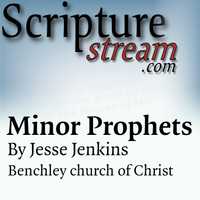Introduction
- Zechariah’s name means “whom the Lord remembers.” He is also mentioned in Ezra 5:1; 6:14.
- Zechariah was contemporary with Haggai. At this point in history, the people had returned from Babylonian captivity and built the foundation of the temple but gone no further. Zechariah’s mission was the same as Haggai – stir up the people to build for the Lord.
- The book was written about 520 B.C.
- Many of the prophecies in Zechariah seem to have dual fulfillments – one near term meaning and a second, longer term fulfillment in Christ. Many of the prophecies in the book are Messianic.
Zechariah’s message
- Zechariah 1:1-6 – God had punished their fathers with Babylonian captivity. That should have been a lesson to them, as well as to us. Romans 15:4.
Eight Visions
-
Zechariah 2:1-13 – God will rebuild Jerusalem as a town without walls.
-
Zechariah 3:1-10 – Filthy garments are referring to the sins of the people. God would remove sin through Jesus.
-
Zechariah 4:1-14 – Zerubbabel would finish the temple, but by the spirit of God (Ezra 6:15).
-
Zechariah 5:1-11 – God would cut off sinners over the whole earth.
-
Zechariah 6:1-8 – God’s winds of judgment sent forth upon the people on Judgment Day (Jeremiah 49:36).
Joshua the priest
- Zechariah 6:9-15 – Joshua was a type of Christ, who would sit on His throne as priest.
- Zechariah 7:1-14 – See Jeremiah 41:2; 52:6. Jews were fasting because of terrible events in their history, but these fasts were not commanded by God.
